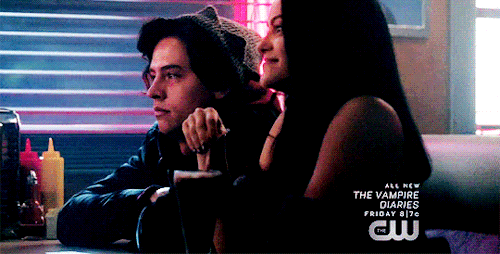"Sometimes we don't choose the ideas. The ideas choose us," -Allison Tait
This week, Lauren and I binge-watched Riverdale. No need to comment on how late we are.
As usual, we'll start with the bad. And boy, was there a surprising amount of it.
1. Betty's Character (or lack thereof)
Betty was by far my least favorite character. At times, even Archie was more expertly written. While Betty did do the most to further the murder plot, and her history was interesting, Betty herself was not interesting at all.
Breaking it down to it's most basic, characters need to have two essential things: an interesting personality, and an internal conflict.
Betty is ultimately uninteresting. No part of her personality is captivating to the audience, nor makes us want to watch her. What makes Veronica so charismatic is her bold confidence, her commanding presence. What makes Jughead so lovable is his dry humor. What outstanding personality traits does Betty have, to distinguish her from the tired girl-next-door archetype? Any personality trait that makes her charismatic, engaging, or enjoyable? Central characters need to be interesting and charismatic, so they hold our attention until we connect with them emotionally.
Betty's internal conflict - if you can even call it that - is brushed to the side. All characters need to have an internal conflict. It's like a requirement. Jughead has his low-self esteem, and his messed up family. Veronica has her identity crisis to handle, along with her messed up family as well. Even Archie has an internal conflict, with him balancing his dad's work with music and football.
Sure, you could argue that it's the 'darkness' inside of Betty is her internal conflict, but is that ever explored? No. Should it have been explored? Yes. Could it have been explored more? A thousand times yes.
We spend so much time with Betty and her family, but her internal conflict is barely even touched on. Everyone else got moments for their internal conflicts to be discovered and even resolved, sometimes. But Betty didn't get that time of day, and before you try and tell me she deserved more screentime, please refer to the first problem I mentioned with Betty as a character.
2. Confused Narrative
This point is a big one, because it covers the many structural and writing errors in this show.
Before we get into the meat of the show, I'd like to discuss how convenient some plot points are. People hear things because they need to, people overreact to cause drama, etc. It was a cheap way to further the plot, sometimes.
Onto the big structural failings.
First, is it's lack of a protagonist. Argue all you want that this is a group narrative, but an integral part of fiction is the protagonist. Not necessarily the main character(s), but the protagonist.
What I mean by this is that a main character is someone we spend a lot of time with in the narrative. The main characters are Archie, Betty, Veronica, and Jughead. All other characters are secondary or tertiary characters.
However, the protagonist is the character who the story is about. This is the character who we are supposed to connect with the most, who is the hero, who drives the story. Riverdale, however, is utterly confused about this fact. There can only be one protagonist. That's just how fiction works best.
Archie, who is painted as the protagonist, does little to further the plot - which is the whodunit of Jason Blossom. Archie, who is painted as the protagonist, is a static character. Archie, who is painted as the protagonist, has a very disconnected story from the main plot, and I think that's his greatest flaw.
His internal conflict - music vs. football/dad - doesn't relate to Jason's murder at all. Veronica's and Jughead's internal conflict does, and Betty's external conflict are all intertwined with the messy world that is the town of Riverdale, which is why they flow naturally and are interesting to watch. Unfortunately, the public consensus is that Archie's conflict is too polarized from the actual conflict of the show that it detracts from everything else.
This also has to do with how this show wastes its time. Why were the Pussycats relevant? Why did we spend a whole episode on the talent show, when there were far more important and interesting things that could further character development and the plot? They didn't make us care about Archie, and, in turn, his music, so the episode felt like a waste of time, when it would have been better spent with Betty finding her sister.
The show tries to put the focus on Archie, when the real meat of the show lies elsewhere.
3. Archie's Mommy issues (or, rather, just Archie himself)
Starting with the Ms. Grundy storyline. Aside from it being downright illegal, Archie is supposed to be 15/16 - a sophomore in high school - and Ms. Grundy is supposed to be in her late 20s, early thirties. Despite what Archie says, this relationship is predatory and toxic.
While it was beyond cringey while it was happening, when Ms. Grundy was removed from the scene, Archie became much less interesting, if that was even possible. All of the questions that it raised were brushed aside. Is he doing this because he has mommy issues? What has Grundy done to him to make him trapped in this unhealthy relationship? How will this affect him in the future?
This is much more of an interesting internal conflict than his music vs. everything else.
Something that distinguishes Jughead's writing passion from Archie's music is that we can understand why Jughead likes writing. It is subtly expressed through his narration, his introversion, and his dedication. Inversely, we never can identify with why Archie loves music so much. We're never given an "it gives me inner peace" or an "I love what music can do to the human soul". We cannot see the logical explanation for Archie the character's love for music.
Combined with the show's utter confusion on how to portray Archie as the protagonist, Archie comes off as flat and disappointing.
~
Now, onto the good, which is the reason I didn't rate it a 4/10.
1. Jughead and Veronica
In case you aren't aware yet, Jughead and Veronica are the saving graces of this show. They are beautifully written characters.
First, Jughead. Perfectly charismatic and sympathetic, he adds another layer to the angsty bad boy with a big heart. His internal conflict, and how it wraps itself up in the town of Riverdale, is poignant and interesting. The commentary on his social status, his emotional reactions, everything about him makes him seem, truly, like he's a real person.
We sympathize with him not because he's hot - unlike what everyone else might argue - but because he is flawed, and both the audience and Jughead can see that. We see how his problems affect him and his life, unlike a few other characters. Then, through Betty, Archie, and the whole murder debacle, he faces his demons, accepts it, and overcomes, little by little. He is by far the best character on this show because everything he does furthers his external and internal conflict. He undoubtedly has the strongest character arc.
On to Veronica.
Veronica, whilst being portrayed as the 'rich bitch', is barely second to Jughead in being the best character. Again, she is charismatic and interesting.
Her internal conflict - her identity vs. her father/family - is a perfect layer to this ultimately complex small town, and it was explored tactfully and perfectly. She turns the idea of the 'rich bitch' on its head. We see her post-character shift, and the audience is pleasantly surprised by her genuine goodness, despite her villainous vixen-esque looks and attitude. It makes her all the more interesting and compelling to watch when she's on screen.
Veronica's compassion and devotion to comfort others are admirable, and her struggle to defy her family is a cornerstone of the teenage existence. However, it's done so well that sometimes the cliche notes that her storyline hits can be overlooked because of her compelling nature as a character and how well it's executed.
Like Jughead, none of her actions are meaningless. All of them further her external and internal conflict. They blend together almost seamlessly, and her motivation in solving the murder plot makes her a wonderfully active character.
Jughead and Veronica are faceted and compelling characters who are the protagonists of their own story, and who drive their own external and internal conflicts. They are interesting and well-written, and unfortunately, Betty and Archie just aren't.
Honorable Mention: Cheryl
Because I just had to give her a shoutout. A new iconic Regina-George archetype has emerged: Cheryl Blossom, who has a surprisingly deeper layer than the infamous Mean Girl.
At first, I hated Cheryl. Then, I loved to hate her. And then I found myself genuinely liking her. Not because she was a good person, but because she morphed into a real person.
As more and more of her life is revealed, we begin to see why she is the way she is, and her cruelty has some context, some meaning. Her erratic behavior becomes entertaining and intriguing. Her descent into near madness seems like it was a long time in the making, and it becomes even more satisfying to witness.
Cheryl grows to be more complex throughout the show, paralleling our knowledge of the murder with our knowledge of Cheryl as a person, and this makes for a pleasantly surprising character arc to add to the mix.
But her implied incest with Jason. Holy crap, no thanks.
2. Small Town Dynamic
This is much smaller of an observation, but it really added to the overall watching experience.
They really nailed the dynamics in a small town, or really, a small setting. I live in a small town, and use to go to a really small school, so the twisty drama that was slowly peeled back like layers was engaging to watch.
Riverdale does have a very strong concept. The secretive, murder-mystery works well with the modern portrayal of teenage dysfunction. No one in the town is exempt from secrets, and I will commend this show for constructing and weaving it together so nicely. It reflects the culture of middle, small-town America with poignancy. The dynamics between the football players, the good girls, the rich bitches, and the outcasts reflects the culture of an enclosed environment.
The town lore, although darker than what I'm used to, is realistic in terms of the way that it influences the people and the society. The setting was colorful in the way that a murderous clown is, and the ambiance/aesthetic of the small town is spot on.
I'll also commend it for not having massive twist endings. Sometimes shows like that can be exhausting, but the show used them wisely to shock the watcher at the appropriate times.
~
In short, Riverdale isn't as good as everyone said it was. Betty and Archie suck, and it has poor narrative structure because of convenience, protagonist confusion, and time wasting. Despite that, it's clever plotting, overall concept, and two most developed characters are what made me enjoy this tv show regardless.
~
6.5/10 would recommend. Now, just because I rated this show a 6.5/10, doesn't mean it's a bad movie. Think of it like a 65% on Rotten Tomatoes. Above average (5/10) but nothing great or special with some glaring pitfalls. Don't get your Middle American scandals in a twist.
~The WordShaker











